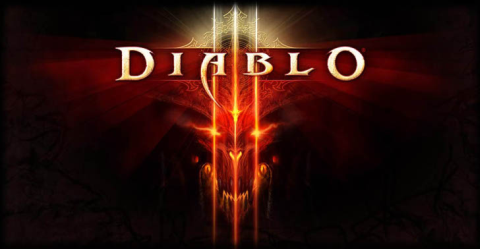

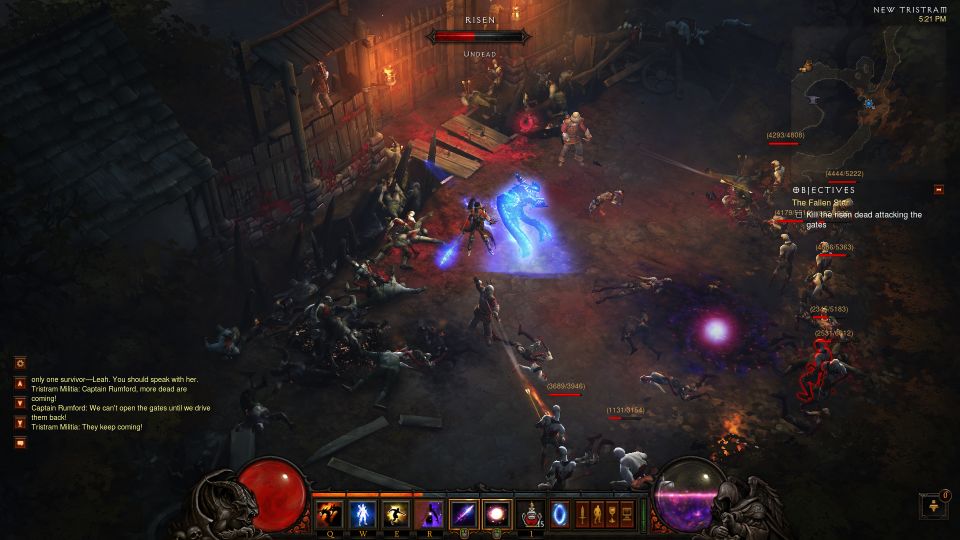
This is an article that's been sitting around in the planning stages for a long time. I've had the Diablo 3 shortcut sitting on my desktop for over a year now without once clicking on it to launch the game. With the impending release of the console versions of D3 coming up soon, now seems like a good time to revist the subject of Diablo 3, and put a close to this section of my website. For a game that launched with such immense fanfare and promise, it's hard to believe how little long-term impact D3 had on the larger gaming community. While D2 remained extremely popular for many years after its release, D3 was virtually forgotten by the end of the 2012 calendar year. Its rise was meteoric (over ten million copies sold in the first few months) and its fall equally catastrophic (D3 had one of the fastest abandon rates of any online game ever). With the hype and excitement in the rear view mirror at this point, let's examine what specifically went wrong with the design of Diablo 3.
I want to establish one thing at the outset: D3 is not a "bad" game. It certainly does not belong on the short list of "worst sequels ever", as I've seen bandied about in some corners of the Internet. There were no crippling bugs in D3, the presentation values were almost amazingly good, and if you only played through the game a single time, you would most likely be happy with the experience. Indeed, many of the biggest problems with the gameplay only became apparent on multiple playthroughs, especially on higher difficulty levels, which helps to explain why so much of the initial reception of the game was positive. I pride myself on not getting taken in when it comes to gaming reviews, and even I had very positive impressions from my character run on Normal difficulty. The word that best describes the Diablo 3 experience is "unsatisfying", a feeling that the game was decent enough for a little while, but failed to live up to its predecessors and squandered the enormous potential that it could have had. This article is designed around understanding how and why so many fans walked away from D3 with that unsatisfied feeling.
I'll run through a number of these points in list form.
No Customizable Stat Points
Technically the stat points are still in the game in D3, but you don't get to assign them, and they may as well not exist given how they function passively in the background. We're leaving out stat point gains from items for the moment, we'll get to the problems with itemization in a little bit. This was something that was controversial prior to release, as Blizzard's development team made it clear that they were removing the ability to assign stat points on leveling up. The stat points were the absolute core of the original Diablo's character system, and were still an important part of the gameplay in D2, so this represented a major shift. Blizzard argued that the stat point system was an outdated design element, difficult for newcomers to understand, and represented a "burden of knowledge" penalty that only experts utilized correctly. In D2, you wanted exactly enough Strength and Dexterity to equip your chosen items, and everything else generally went into Vitality. There was an optimal stat point allocation for each build, and anyone who didn't know that setup was wasting many of their points.
These arguments are quite correct, and I completely understand why Blizzard made the decision that they did. However, what this overlooked was the fact that 99% of the people playing Diablo were not power gamers who needed or even cared about an optimal allocation of stat points. In fact, screwing around and making mistakes was part of the fun! I knew one guy who decided he would put every single point into Strength just to see how far he could get with that setup. It was horribly suboptimal, but so what? It was fun. The variant community at Realms Beyond made a living from having characters who never assigned any stat points at all, they'd be running through Hell with 300 unused stat points on their character sheet. Removing the customization of stat points eliminated these kind of choices from the game. Now that would have been fine if they had been replaced with something else interesting in terms of building characters... but they were not. It was simply a removal of customization and nothing else. This contributed to a sense of blandness, where every Barbarian felt exactly like every other Barbarian in D3, not helped either by the new skill system.
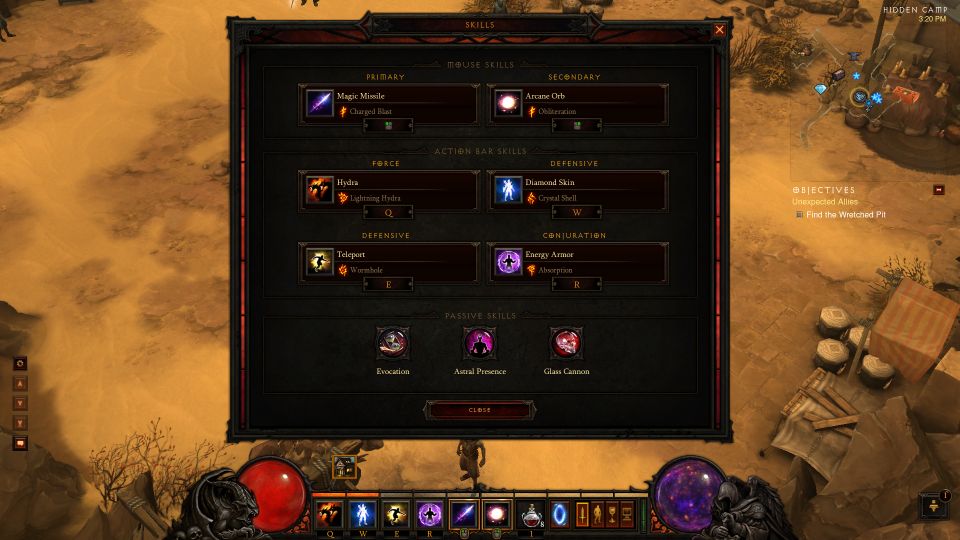
Skills System Boring and Homogenous
The design from D3 removed the skill trees from D2, and the whole notion of skill points. Instead of picking skills and assigning points on level up, skills were unlocked automatically in a set progression for each class, a progression that never varied or changed. Skills in D3 could then further be customized by runes, with five runes for each skill, granting the theoretical possibility for hundreds of different skills, and an infinite variety of combinations to mix and match. On paper, this system sounds absolutely amazing, and it is while the newness factor is in operation. But with the passage of more time, the gilt starts to come off this system and begins to reveal the lead laying undernearth.
One of the biggest problems with this system is its sheer rigidity. Each of the five classes unlocks every skill and every rune in the same order, on every playthrough, no matter what you do. And because there are no skill points to assign, each one of those skills will always function in the exact same fashion for every character of the same class. There is no option to dump all of your skill points into the Firebolt skill, and play an underpowered sorcie (anyone remember Ember's story?) Because every skill scales off of weapon damage, there are no starter skills or weak skills anymore. That's a laudable design goal, and I fully understand why Blizzard tried to do things this way. Unfortunately, one of the net results is that all of the characters tend to play the same way. It doesn't really matter what skills you choose to take, they're all scaling off weapons damage and doing pretty much the same thing. Nor can you choose to play a deliberately weak variant character for extra fun and challenge. It's all the same, and it gets very bland very fast. There is no real reason to create more than one character of the same class in D3, since they can change their skills around at any time. While this started from a positive design idea, to remove the sense that players "wasted" skill points in early game skills, it also did much to kill replayability. In D2, I want to create new characters to test out a different skill path. In D3, there's simply no point.
And it's not just the case that every Monk can instantly change their skills and turn into an exact copy of every other Monk, although that's already a huge problem. The different classes simply did not play out very differently in my experience, due to the way in which they were all shoehorned into the same "skills scaling off weapon damage" and "primary/secondary skills" system. In D2 for example, there's a huge difference between a Sorcie who's casting spells to deal damage and an Amazon who's auto-attacking much of the time and throwing in spells for extra damage. In D3, due to the way in which a primary skill like Magic Missile has been added to the game, there just isn't much different between a Wizard left-clicking to attack at range and a Demon Hunter doing the same thing. Nor does it even matter what weapon your characters are holding in D3; they could be holding anything, since all of the damage is determined by the weapon's DPS rating. In the older Diablo games, it really mattered whether your character was using a sword, or a polearm, or a bow, or whatever. In D3, the weapons are all essentially interchangeable, and this does much to make all of the classes much less unique as well.
It doesn't help either that most of the skills in D3 are heavily cooldown based, which again removes many of the tactical considerations from the gameplay. In D2, a sorceress or a necromancer can empty their whole mana ball in a few seconds if they need damage RIGHT NOW, and indeed this was a huge part of the fun in that game, guzzling the mana potions and setting off a dazzling array of pyrotechnics. This is not possible for the majority of the skills in D3, since most of the non-primary skills are on cooldowns that require the player to sit and wait before using them again. (Mana potions don't even exist in D3.) Oh sure, this is all standard for most online games these days, but it still represents a major shift from the gameplay of a decade earlier. The best example to me was the sadly nerfed Teleport skill, which in past games could be used endlessly with no cooldown and led to many an insane waypoint run through hordes of monsters. The Teleport skill in D3 can be used once (or two to three times with the right rune) and then it goes on cooldown for a dozen seconds. It's simply boring to use, and this is a common problem throughout D3's skill sets. Blizzard was so busy trying to balance everything for the power gamers that they forgot to make the skills fun and interesting to use.
D3 also strictly limits players to primary, secondary, and then four other action bar skills, with an utter maximum of six that can be used at any time. (There are also of course three purely passive skills to choose.) This always seemed like an odd choice; why limit players to only six active skills when there are 30 different choices for each character class? With some skills having extremely long cooldowns, it always felt as though there was plenty of room to let players pick eight, ten, or a dozen skills if that was what they wanted. I certainly did in past Diablo games, even if I mostly stuck to a handful of skills. Why the restriction? Well, now we know: D3's design was specifically limited to make it easier to do the console port later on.
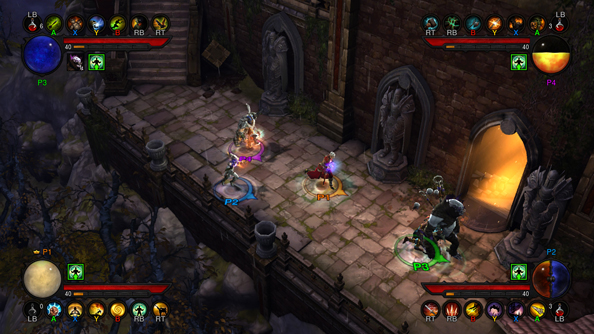
What a coincidence, the six skills limitation from the PC version turns out to match up perfectly with the buttons on an XBox controller! Mercy me, amazing how that just happened to fall together perfectly. Now I'm not one of those people who looks down at consoles and sees console gaming as inferior - I've been console gaming for almost three decades now, and there are many advantages to consoles. However, I also believe that PC games should be designed with PCs in mind, and console games should be designed with consoles in mind. Trying to shoehorn PC gameplay onto consoles, or vice versa, results in gameplay that doesn't please anyone (see the N64 version of Starcraft, for example). Blizzard deliberately limited the skill system in D3 to make it easier to do console ports down the road, despite their denials to the contrary, and that does disappoint me greatly. I'm totally fine with porting D3 to other platforms (heck, the original Diablo was ported to the Playstation), but that never should have had any bearing on the game's design. Shame on them. 
Online Problems
D3 differed from its predecessors by requiring a persistent connection to the Internet at all times. There was no such thing as a Single Player game in D3; even when playing by yourself, you were simply engaging in a Multiplayer game with no one else present. Everything ran off of Blizzard's servers at all points in time. Although this may have been a minor irritant for some people, it was an unnecessary design step that led to real harassment and serious problems for others. I remember logging into the game shortly after D3's release, only to find that the Blizzard servers were down. Can't play the game. But I only wanted to use my Single Player character! Doesn't matter, anyone who wanted to access D3 had to go through Blizzard's servers, every single time. This also meant that it was impossible to play the game without suffering through server lag, which could be quite bad at times, so no Hardcore characters for me. I had zero interest in losing a character permanently because of a faulty connection issue. I can understand the requirement to log into a game like League of Legends or World of Warcraft, since those are games that require online interactions with other players. Obviously you have to go through the Riot or Blizzard servers to utilize those games, and sometimes they are down for maintenance or whatever. But D3 was designed as a PvE game (player vs enemies), and most people played the game solo. The various online restrictions were a real pain in the ass, and not just in the immediate week of launch.
Was there any reason for Blizzard to implement these online requirements? They argued that it was important for security concerns, but that always felt dubious, given the rampant problem of accounts getting hacked, which was surely made worse by the requirement for every single account to log into Blizzard's servers for every play session. Much like EA's assertion that their most recent SimCity game had to be online to function properly, the argument that D3 had to have a constant Internet connection for security purposes turned out to be a complete sham. The console versions of D3 won't require the same persistant online connection, which showcases how unnecessary the whole idea was in the first place. Blizzard insisted on an Internet connection in D3 simply because it benefitted them as a company to do so, in order to cut down on the used game market and resales of their game, and to ensure that they funneled as many people as possible to their online auction house. It certainly didn't do much of anything to stop people from pirating D3 if they wanted to do so. The whole online system had everything to do with maximizing revenue for Blizzard and Activision, and cared not a whit for improving the player experience. While I can't speak for anyone else, the whole system turned me off from wanting to play D3, and made me less inclined to continue with the game. But hey, they got my purchase money for D3, so I guess they don't care about anything else, right? Gaming publishers rarely think about anything beyond the next quarterly statement, and seem to care little about degrading the quality of a brand name if they can make a quick buck in the short term. It will be interesting to see how a Diablo 4 is received, if and when one is made.
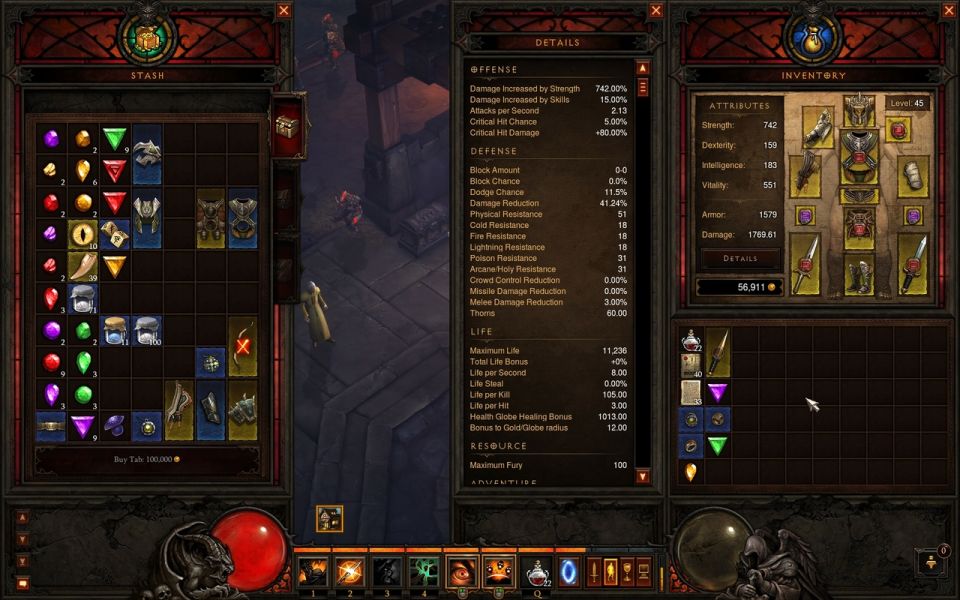
Itemization: A Snooze-fest
Itemization is probably the single biggest issue with Diablo 3 as a game. Before reading anything else from me, go ahead and look at this Infographic on the subject. It's too large to put on this page, go read it in another window. I'll wait for you to finish.
Read through that? Good! It's a nice summary of some of the major problems. The most basic problem with D3's itemization is that it's far too simplistic. Leaving aside very high-level Inferno play, there are only three stats that matter at all: health/Vitality, primary stat, and weapon damage. The amount of damage on weapons is the single most important stat in the game. Everything, and I do mean EVERYTHING, scales off of this. As mentioned in the skills section above, the actual skills that your character happens to be using barely matter at all. The one thing that matters is the DPS rating on your weapon. This will determine whether your skills are being laughed off by the enemies or running roughshod over them without breaking a sweat. The actual weapon type itself is completely irrelevant. You'll see a different graphical effect being carried around on screen, and that's it. All five classes use a primary skill of some kind for basic attacks, which also scales off weapon damage (like everything else), so what does it matter what you're carrying? Characters could be walking around with an ice cream cone in their hand for all it matters in D3. Just look at the DPS rating, and ignore everything else. It doesn't matter. None of the other modifiers or stats matter. DPS only. I mentioned this back in my initial review, and pointed it out as a serious problem even then. The more time that you spend with D3, the more problematic the whole idea of weapon damage becomes. Every weapon is exactly the same for every character class. It all becomes boring incredibly quickly.
After you've dealt with the weapon damage issue, all other itemization can be summed up in two stats: Vitality and primary stat. Vitality gets turned into health in D3, stack as much of it as you can. Primary stat (Strength/Dexterity/Intelligence for different classes) gets turned into more damage, making it another version of weapon damage. Stack as much of this as you can too. Every other stat in the game? Worthless. Just stack the maximum amount of Vitality and whatever your class happens to have as its primary stat, and you're good to go in virtually every situation. You don't even need to see the character graphic in the picture above to know that it's a Barbarian, since all of the stat points and all of the gems haven gone into Strength and Vitality. It will be exactly the same for every other Barbarian too.
This also leads to incredibly boring itemization, since every piece of gear is another variation on the same two numbers. From my own experience, my Wizard character had Vitality and Intelligence on absolutely everything, and all of the stuff was boring as hell. It was completely interchangeable, there was nothing memorable or interesting about any of it. Nor does this change at any point in time from the beginning of Normal up to the end of Inferno. Get the maximum weapon damage rating first, then max your Vitality and primary stat. There's no customization to speak of, since you'll be crafting gems that add to Vitality and your primary stat, and there are no runes or charms in the D2 sense to round out equipment. You can't use unique items because they've been all but removed from the game due to the online auction house (more on this next). It's an endless dreary sea of faceless items with nothing to distinguish them apart, in a long succession of slightly higher numbers. Is it any wonder that so many people tired of this system so quickly?
One of the things that the Infographic touched upon was the lack of useful items in D3 that drop in earlier portions of the game. This is one of the problems that I discussed in my earlier articles on D3, the problem of having too much scaling. The game scales way too hard and way too fast. Any item found at the beginning of an Act will be badly outdated by the start of the next Act, and hopelessly antiquated by the start of the following Act after that. This is totally different from past Diablo games, where it was possible to find quality uniques or otherwise unorthodox gear in Nightmare or even Normal and then make use of them for a full character run. Here's an example of something I found in Normal with my melee skeleton summoner Kell in D2:
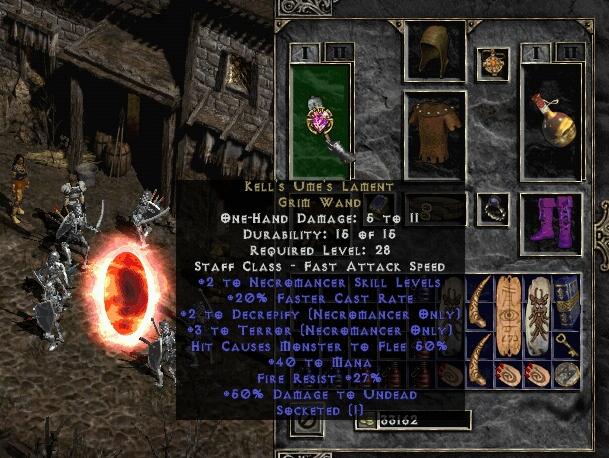
Ume's Lament wand has both +2 necromancer skills and 20% faster cast modifiers on it. This was a find that this character would be able to use straight on through to the end of Hell, although Kell never made it that far. I used the socket quest to stick a 27% fire resist jewel in there, and I had a great and memorable item that helped to define this character. Nothing like this would ever be possible in D3. Any weapon would have to be upgraded every few levels to keep pace with weapon damage, or else the character would quickly become useless. Things like faster cast and elemental resistances don't seem to matter at all in D3; as we know, only Vitality and primary stat matter for beans. And there are no skill levels either, part of what makes the skill system so uninteresting. In short, I could never find anything like this from random drops in D3, and my characters would instead be going through an endless slog of similar items. Nothing in Normal or Nightmare would ever, Ever, EVER be even faintly usable in Inferno in D3. Even if by some untold miracle a unique weapon were to drop (which itself is almost impossible, can't have too many uniques clogging up the auction house!), it would soon be outclassed by a better weapon with a higher DPS rating. All of the uniques with odd modifiers from D2, the ones that let characters access the skills of other classes and such, they either don't exist at all in D3 or have such an impossibly rare chance of appearing that you'll never see one. This is all made much worse for anyone intending to play their characters in pure fashion, using only the gear that they can find themselves, instead of twinking and muling and outright purchasing their gear online. It is most sad.
For the purposes of optimal play, a character needs to upgrade every piece of their gear roughly every five character levels. (It's almost like the game design was intended to push people into purchasing items in some kind of online store...  ) Characters also scale just as hard with levels as they do with items; I used before the example of how one point of Viality = 10 health at level 1, while one point of Vitality = 35 health at level 60. That's per point, mind you. Because you'll be getting more Vitality from gear as time passes, this means that characters scale exponentially over time in their power curve, to try and match the same exponential curve of the monsters. A nasty side effect is that it's almost impossible to play D3 with friends online, unless you are exactly the same character level and have the same general quality of gear. Trying to play co-op with someone as little as five levels ahead will see them totally untouched in godmode fashion, while you struggle to keep up, or vice versa. Blizzard disguises this with their random matchmaking algorithm, always putting people together from the same part of the power curve, but it's horribly obvious if playing with friends. No one is having fun with this system, and it makes it really tough to play the game with friends. Too much scaling between characters.
) Characters also scale just as hard with levels as they do with items; I used before the example of how one point of Viality = 10 health at level 1, while one point of Vitality = 35 health at level 60. That's per point, mind you. Because you'll be getting more Vitality from gear as time passes, this means that characters scale exponentially over time in their power curve, to try and match the same exponential curve of the monsters. A nasty side effect is that it's almost impossible to play D3 with friends online, unless you are exactly the same character level and have the same general quality of gear. Trying to play co-op with someone as little as five levels ahead will see them totally untouched in godmode fashion, while you struggle to keep up, or vice versa. Blizzard disguises this with their random matchmaking algorithm, always putting people together from the same part of the power curve, but it's horribly obvious if playing with friends. No one is having fun with this system, and it makes it really tough to play the game with friends. Too much scaling between characters.
Enemies scale in the same fashion, increasing in health and damage as time passes at an almost ludicrous rate. I'll reuse this example from last year:
Act 1 Ghoul
Normal: 41-82 HP, 43 damage
Nightmare: 339-678 HP, 397 damage
Hell: 2800-5601 HP, 3677 damage
Inferno: 13000-26000 HP, 180000 damage
The gameplay has been deliberately set up so that players must sit around and farm gear at the beginning of new Acts until they have enough new goodies to deal with the massively scaled up opponents. Or they can simply buy what they need online if they get tired of farming for better gear, and you don't have to be a cynic to see that D3's gameplay is very obviously intended to push players in this direction. "But wait! Can't players who are really good at the game just get past obstacles with lesser gear?" Heh. If only that were true. That brings up to the last and most important section of this review.
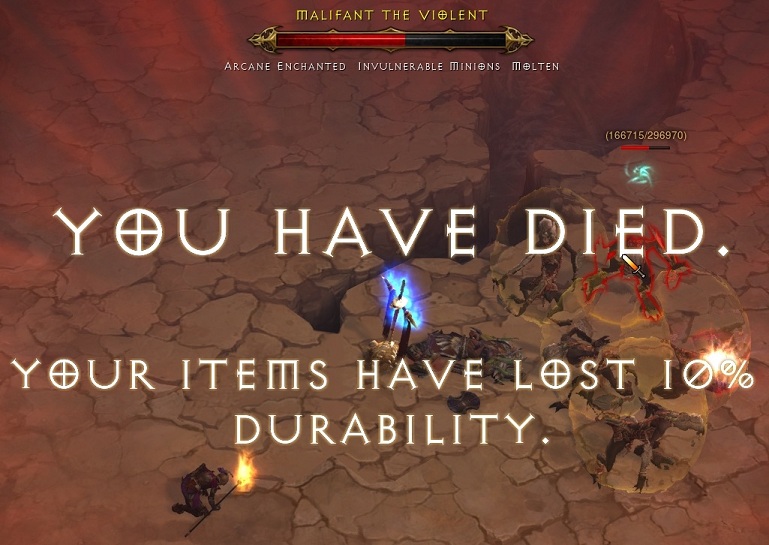
Diablo 3's Fake Difficulty
D3 is one of the most blatant examples of fake difficulty that I've ever seen in a game, and it's an intentional product of the game's design. First of all, let's define what I mean by the term fake difficulty. From the TV Tropes webpage:
"When you play a video game, you expect be able to use your skills as a gamer to beat whatever challenges the game throws at you. If the challenges requires a lot of skill, the game is hard to win. If it doesn't require much skill, it should be an easy game. However, some games that should be relatively easy are actually quite hard. It could be due to shoddy programming, a Game-Breaking Bug, poor implementation of gameplay elements or time constraints, or the developers threw in something which makes the game harder, but which has nothing to do with the player's or AI's skills. This is fake difficulty."
Most of the time, fake difficulty refers to poor programming or amateurish game design, with things like terrible controls or a game that has some impossibly cryptic plot token needed to complete the game. In the context of D3, it refers to the last sentence quoted above: "the developers threw in something which makes the game harder, but which has nothing to do with the player's or AI's skills." This is a perfect description of the highest difficulty settings in D3, Inferno and to a lesser extent the last parts of Hell. D3 differs greatly from its predecessors in downplaying the action elements of the game in favor of emphasizing the gear elements of the game. In prior Diablo games, it was possible to complete all three difficulties with severely underleveled and underitemized characters, simply through incredible player skill level and deep knowledge of game mechanics. This was pretty much the founding principle behind Realms Beyond as a website, as the variant group of players that made up Realms Beyond Diablo found ways to beat the game with no gear (Naked Mages) or even cursed gear that LOWERED your stats (Beyond Naked Mages). This easily carried over to Diablo 2, with crippled variant characters poking around with all sorts of crazy stuff and still managing to complete the three dot run. Everyone expected the same kind of gameplay to carry over to D3 as well.
The whole variant community was in for a rude surprise. In D3, it is not possible to overcome weaker gear through sheer player ability. D3 is full of unavoidable damage at every turn, monster attacks that simply cannot be dodged and have to be tanked through. I noticed this while playing myself; no matter what I did, and no matter how carefully I played, I would still take damage constantly. This was of course made much worse due to the changed potion system in D3. In past Diablo games, your characters had a belt full of potions, mapped to the number keys on the keyboard, and intelligent usage of potions was an integral part of the gameplay. I have watched highly skilled Diablo and D2 players take severely underpowered characters through seemingly impossible situations by knowing exactly when to drink through a belt of full rejuv potions. Careful resource management and timing of potion use was a crucial ability that separated the skilled from the unskilled. But none of this is possible in D3, which replaced a belt full of potions with a single "potion slot", with the potion slot going on a 30 second cooldown after each use. The mechanic works decently in Normal difficulty, since a potion will give you a full health restore equivalent to drinking a full rejuv in past games, but by Hell and Inferno difficulties, the potions don't even come close to restoring your health, and the 30 second cooldown never goes away. They are virtually useless altogether in Inferno. All of the gameplay centered around the tense and exciting "full belt fight" from prior games ceased to exist... which means that winning or losing battles comes down to your gear yet again. (Oh, and by the way, this was another gameplay alteration that had everything to do with making console ports easier down the road. Check out the screenshots from the XBox or PS3 versions of the game, and note how the "potion slot" is mapped to a controller button instead of a belt of potions mapped to the numbers on the keyboard. Blizzard, if you want to go make a console game, then go make a console game! Don't screw with your PC game design because you're lazy and want to make console ports easy. Sigh.)
Past Diablo games simply did not work this way. D3 makes it impossible to dodge many kinds of damage, and removes the ability to mitigate damage through skillful potion usage by nerfing how potions work. You can't even Town Portal out of bad situations because town portal scrolls have been removed from the game, in favor of the innate channeling portal ability... which doesn't work in combat. Once you reach a certain point in late Hell or Inferno difficulty, all of that unavoidable damage will one-hit kill your character if you don't have the "correct" gear to continue progressing. This is known as a "gear check", and it necessitates farming up an entirely new set of equipment to reach the point where your character can move forward again. Then, if you're willing to do that for Act I of Inferno, be prepared for another gear check at the start of Act II Inferno, and another round of entirely new items that you absolutely need to progress but won't drop in any earlier locations of the game, and so on. Rinse and repeat for each new area until the game is over. Each of these steps will take untold hundreds of hours to complete if you plan on farming the items yourself, while being subject to the whims of what happens to drop from the game's random number generator.
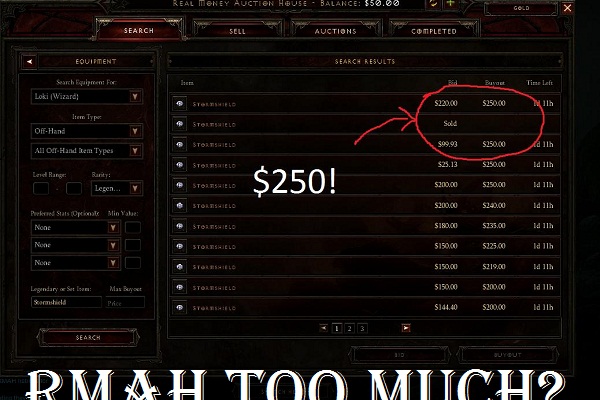
And the whole time there's an auction house sitting there online that allows you to shortcut the entire process. If you're willing to spend your money. 
Everything about D3's design has been meticulously set up to funnel players in this exact direction. It's actually quite brilliant, in a diabolical way, how D3's gameplay has been so carefully crafted to force people into using the online auction house. Because of the game's incredibly hard scaling rate, players absolutely must upgrade their equipment early and often, and players are forced to do so over and over again as they progress throughout the game. The items that drop naturally throughout the game fall woefully short of what players need, at least once they start to reach Hell and Inferno difficulties. At this point, players are forced into a choice: spend untold hours farming the same areas in the hopes of getting the drops that they need to progress, or venture onto the online auction house, where Blizzard gets a cut of every transaction. Players will be faced with the same choice with every new Act that they reach as they continue on through the game. Playing D3 on Inferno is a Sisyphean task, endlessly pushing the boulder up the hill in search of better gear, only to come crashing down again with each new area reached. How anyone could enjoy this sort of thing is beyond me.
D3's challenge is the worst kind of fake difficulty, based entirely on whether or not players have managed to achieve a high enough level of gear. While player skill level does play a factor, it's far lower than in any previous game in the series. D3 actually resembles a traditional turn-based RPG in many ways, where character levels and equipped items are the main factor in determining victory or defeat, rather than the ability to dodge skillshots and kite mobs the way one would expect in an action game. Have the "correct" items for this level of enemy? Congrats, you win! Don't have good enough gear? Sorry, it doesn't matter how good you might happen to be in terms of player skill level, you get hit with unavoidable damage and die. Watch this random YouTube clip of someone playing a Barbarian in Inferno to see what I mean. This guy isn't doing a darned thing in terms of tactical play. He walks right into the middle of enemy mobs and uses Whirlwind. But, because he passes the "gear check" for this particular area, he wins every battle. It's an appaling example of fake difficulty, and it's completely intentional on the part of Blizzard. D3 has been deliberately designed to function in this way, to force you into the auction house at every turn.
This is the feeling that has gripped so many people playing Diablo 3, even if they weren't able to articulate exactly how or why they weren't enjoying the game. D3's design intentionally forces players into a boring and unsatisfying treadmill, where it's essentially impossible for them to find useful or interesting gear, and where their personal skill level has little impact on the challenge level of the game. Blizzard set this up to force people into the auction house, which despite their claims is as integral to the overall design as the blacksmith or the jeweler. I just laugh when people try to claim that the auction house isn't a problem, or that you can simply ignore it and not use the feature. No, I'm sorry, you can't simply ignore the auction house. It's a fundamental part of the game, and it's impossible to progress your character in Inferno without making use of it to at least some degree (unless you have an impossibly large amount of free time on your hands). Blizzard also deliberately killed the drop rates of anything useful or unique for auction house purposes, which means that it's affecting your games whether you use it or not. Literally every single design element of this game - the way every skill works off of weapon damage, the massive enemy scaling, the constant need to upgrade equipment, the gear checks with each new Act - it's all based around the auction house. When you see the game from this big picture perspective, the comparisons of Diablo 3 to a giant Blizzard sweatshop start to ring true.
Fortunately, there's an easy way out of this dilemma: stop playing Diablo 3. That's the conclusion that I reached after about six weeks of play, and I was hardly the only one, as the mass exodus of the playerbase in the months after release testified to. For me, the breaking point was late Hell difficulty for my Wizard. I had stubbornly refused to use the auction house, and I had not been fortunate enough to find a good weapons drop in a long time. Finally I broke down and purchased something better, my DPS more than doubled instantly, and the monsters that I had been struggling to fight before went down like dominos. That killed any interest I had in the game, and I quit right then and there. What was the point? I won or lost based on the item game, and I had zero interest in farming up gold to buy gear. The only way to win that game was not to play at all.
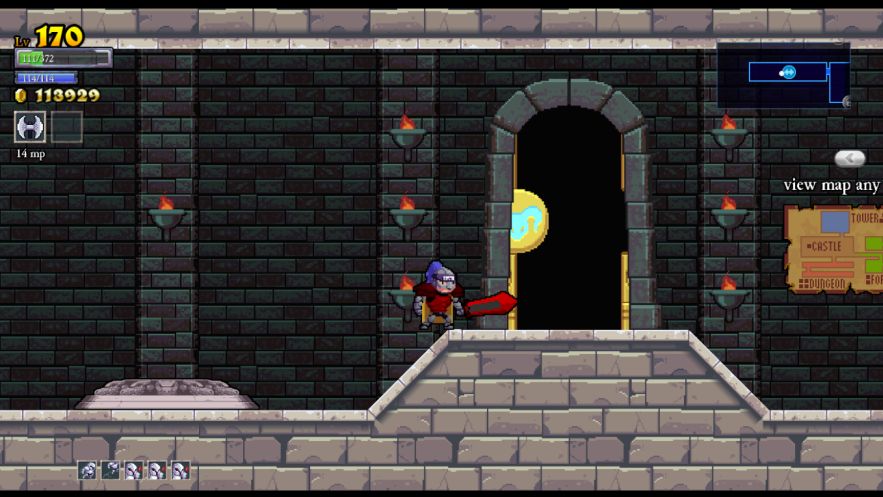
Conclusion
At its heart, Diablo 3 ultimately failed to satisfy most players because it was designed with corporate shareholders in mind instead of the actual gamers who would be using the product. At every stage of the design process, D3 appears to have been created with the thought, "how can we generate the most revenue from this product?" instead of asking the question, "what would make this game fun to play?" Customization of characters was strictly limited, without stat points and severe limits on skill choice. Itemization was made incredibly bland and uninteresting. A scaling system was put in place to require constant upgrading of gear, and the gameplay reworked such that gear checks were infinitely more important than player ability. It was all designed to shepherd the player base into the auction house, and force them to spend their money there if they wanted to continue to progress through the game. For all of its incredible beauty and years of development time, D3 at its heart turned out to be a big budget version of one of those "Pay to Win" iPhone games.
But what Blizzard forgot somewhere in this huge process was that the game simply wasn't fun to play, not after the initial newness factor wore off. It's not fun to have cookie cutter characters where the skills all feel the same. It's not fun to effectively remove unique items from the game because the parent company doesn't want them showing up in the auction house. It's not fun to force an endless series of gear checks on players, and kill them instantly if they don't have the proper level to move forward. Above all else, buying items from an online auction house is a lot less fun than finding them yourself from completing quests and killing bosses. It's truly amazing how a massive corporation could sink hundreds of millions of dollars into developing a game like Diablo 3 and not realize such basic facts. They made a dungeon crawling / treasure hunting game in which crawling through dungeons was boring and you were supposed to purchase most of your treasure in an online store. It's nothing short of incredible that no one threw themselves in front of this at some point in the design phase. Diablo 3 ultimately failed to satisfy because it failed to understand basic human nature.
I threw in a picture from the indie game Rogue Legacy above, because I think that the contrast with D3 is interesting. Both are dungeon crawlers with randomly generated levels, with the focus on collecting various items that drop from monsters, and Rogue Legacy even has its own version of Nightmare and Hell difficulties with its New Game Plus modes. Rogue Legacy operates on a much smaller scale, but I do think the comparison has merit. Despite working with a design team of only a half dozen people and less than 1% of the budget of D3, Rogue Legacy has been a much more enjoyable gaming experience for me personally. I would argue that this comes down to two things, character customization and skill factor. Each time that your character dies in Rogue Legacy, you go back to the starting castle and can spend the gold that you earned on a variety of different upgrades. You could choose to pump physical damage, magic damage, tankiness, and so on. There are then more choices based on what gear and runes you choose to take with you. It's all much smaller in scale than a game like D3, of course, but there's enough for real choice there. There's lots of room to experiment with different variant paths, or you can always choose to upgrade nothing at all if you're a masochist. Within the dungeon, you're playing a 2D sidescroller similar to a Castlevania or Metroid game, and how far you go is mostly determined by player skill. Levels and gear do matter, they matter a lot, but there are already YouTube videos of players beating the game at level 0. If you're a godlike platformer, it can be done!
Rogue Legacy is therefore satisfying for all the reasons that Diablo 3 is not. There are real choices to be made in terms of customizing your character. Player skill ultimately determines success or failure, not gear checks. Rogue Legacy is a hard game, a very hard game, but you'll win or lose based on your own ability. There's no omnipresent auction house looming over the gameplay and there's no forced online logins. The game was made by a tiny development house that seems to have had genuine joy and passion in crafting their games. It's the polar opposite of the massive corporation that Blizzard has become, where every decision is now beholden to Activision's demands for franchise exploitation and new streams of revenue. Rogue Legacy was made because the designers thought it would be awesome and fun to play. Diablo 3 was made because Activision-Blizzard wanted to exploit players through a series of lucrative online financial transactions.

Maybe the proper question isn't asking why Diablo 3 was unsatisfying; perhaps we should be asking why Diablo 3 was able to retain even the small fraction of active players that it did.